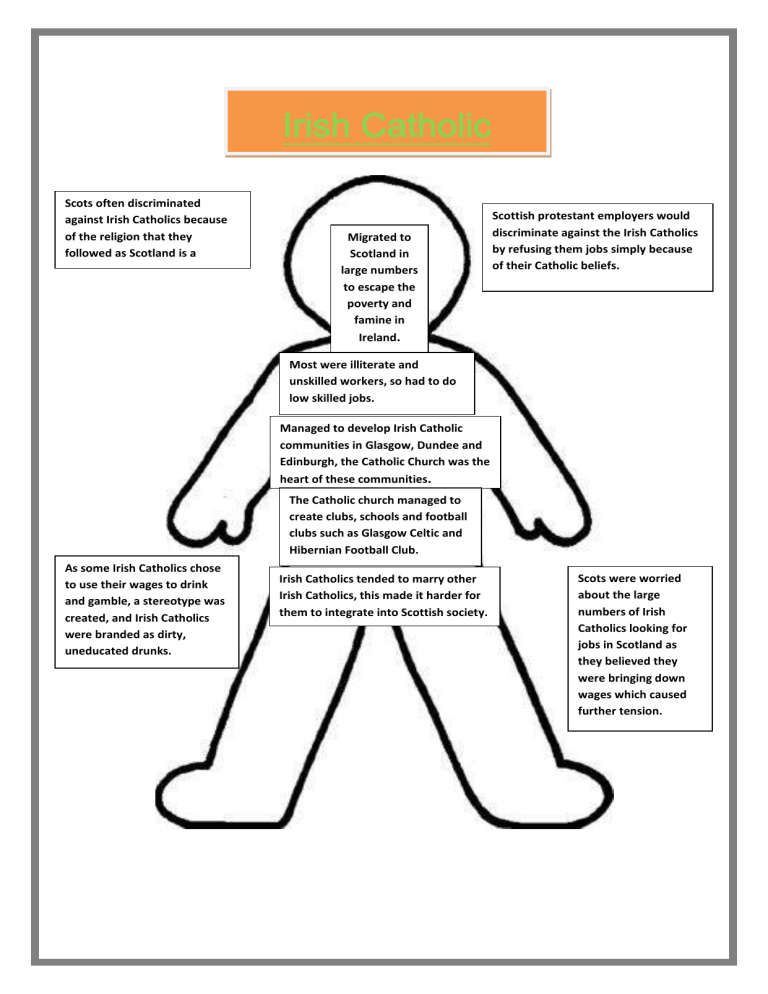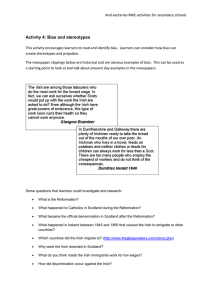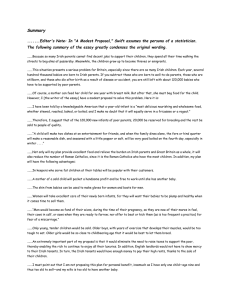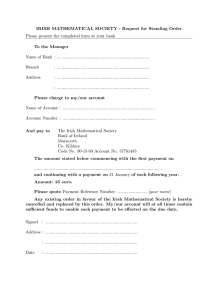Immigration to Scotland: Irish, Jews, Italians, Lithuanians
advertisement

Irish Catholic Scots often discriminated against Irish Catholics because of the religion that they followed as Scotland is a Protestant country. Migrated to Scotland in large numbers to escape the poverty and famine in Scottish protestant employers would discriminate against the Irish Catholics by refusing them jobs simply because of their Catholic beliefs. Ireland. Most were illiterate and unskilled workers, so had to do low skilled jobs. Managed to develop Irish Catholic communities in Glasgow, Dundee and Edinburgh, the Catholic Church was the heart of these communities. The Catholic church managed to create clubs, schools and football clubs such as Glasgow Celtic and Hibernian Football Club. As some Irish Catholics chose to use their wages to drink and gamble, a stereotype was created, and Irish Catholics were branded as dirty, uneducated drunks. Irish Catholics tended to marry other Irish Catholics, this made it harder for them to integrate into Scottish society. Scots were worried about the large numbers of Irish Catholics looking for jobs in Scotland as they believed they were bringing down wages which caused further tension. ng down wages Jews As jews were mostly self employed they were not seen as a threat to their jobs by the people of Scotland. Came to Scotland to escape the religious and economic persecution they faced in Russia. Managed to create Jewish communities based in Edinburgh Glasgow and Dundee. Some Scots accused the Jews of paying people low wages and running "sweatshops" however there is evidence that suggests these claims could be examples of underlying anti-Semitism Over 10,000 Jews lived in Glasgow, most of them lived in the Gorbals area as accommodation was cheap there. Managed to start businesses like butchers shops and bakeries, they also done well in the cigarette and tailoring industries. Jews did experience some anti-semitism in Scotland, however it was rarely violent. By 1939, they had began to make a significant impact on the legal and medical professions and were make enough money to be able to move from areas like the Gorbals to more affluent areas. Jews were discriminated against, however it was not as bad as the discrimination that Catholics faced. Some bowling clubs, would refuse Jews memberships simply because they were Jewish. Italians Italians, like the Jews were not seen as a threat to jobs by the native Scottish people as they were mostly self employed. Migrated to Scotland in huge numbers and made up 25% of all the people who migrated to Scotland between 1891 and 1901 The people of Scotland liked the products that the Italian cafes, restaurants and ice cream parlours offered them. Managed to earn a living in the catering industry by opening ice cream parlours and fish and chip shops, such as Luca's and Nardini's in Edinburgh. Managed to establish Italian communities in Edinburgh, Aberdeen and the largest community was in Glasgow. Most Italians were Catholics as Italian is a Catholic country. Some religious people also had issues with the Italians businesses as they were open on Sundays. The Italians did receive some backlash for their businesses as some people believed they were immoral as they provided young people with a place to gather and misbehave. Italians did face some discrimination and prejudice in Scotland because they were Catholics and would have to put up with name calling on the streets and at school. Lithuanian When they first arrived in Scotland, they were the subjects of suspicion from the Scots who believe they had been brought in to drive down wages and break up strikes. Managed to build communities of Lithuanians, 50006000 Lithuanians lived in Coatbridge in Glasgow. Opened businesses, shops and punlished newspapers written in their language in Scotland. They also attended church in Scotland. Some Lithuanians joined the mining industry and began to join trade unions, Lithuanians also took part in the national strikes. Over time the Lithuanians were able to convince the Scots of their loyalty and removed any suspicions that the natives had of them. Inter marriage with Scots was common so as second generation Lithuanians began to enter higher education, their Lithuanian values began to fade. After time had passed the Lithuanians managed to win over the Scots due to their heavy involvement in trade unions and left wing politics. Most Lithuanians were Catholic, this resulted in them sometimes being discriminated against by the native Scots who were Protestants. Irish Protestants The Irish Protestants did not experience the discrimination that the Irish Catholics did as they shared a religion with the Scottish people as Scotland was a mainly protestant country. Most Irish Protestant workers were well educated and skilled so they often had better access to higher skilled and better paying jobs. Despite most Irish Protestant being skilled workers there were still some unskilled workers who were not accepted as part of the "Labour Aristocracy" Some Irish Protestants were still unskilled and had to do unskilled jobs that paid poorly alongside the Irish Catholics. In 1800, The Orange Order began to be developed in Scotland as a way of helping them to keep their distinct identity as Irish Protestants. The Orange Order was excellent at maintaining their distinct Identity as Irish Protestants, however it often caused tension and violence between the Protestants and Catholics. They managed to set up 12 Orange Lodges in Glasgow by 1835, for Irish Protestants to go to and meet with each other. In 1857, 300 Orangemen were attacked after taking part in an Orange march, this resulted in marches being banned in Lanarkshire for 10 years.




